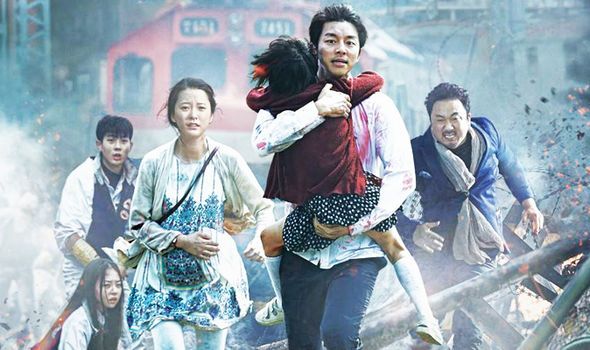 There are a lot of elements that make a zombie film thrilling: characters and relationships we care deeply about, a true sense of survivalism, trendsetting cinematography and makeup, etc. Train to Busan, a South Korean film directed by Yeon Sang-ho, has all of these and more. In fact, Busan does so many things right that we may have reached peak-zombie; I certainly wouldn’t want to be the next guy in line with an up-and-coming zombie movie, because Busan has not only succeeded in its own right, but raised the bar for the entire sub-genre.
There are a lot of elements that make a zombie film thrilling: characters and relationships we care deeply about, a true sense of survivalism, trendsetting cinematography and makeup, etc. Train to Busan, a South Korean film directed by Yeon Sang-ho, has all of these and more. In fact, Busan does so many things right that we may have reached peak-zombie; I certainly wouldn’t want to be the next guy in line with an up-and-coming zombie movie, because Busan has not only succeeded in its own right, but raised the bar for the entire sub-genre.
Businessman Seok-woo is a divorced workaholic and single dad with no time for his young daughter, Soo-an. It’s an estrangement you feel right from the start, as the girl’s grandmother appears to be the primary caregiver, plus we learn Dad skipped daughter’s school play. (Not cool, Dad.) As part of her birthday gift, Soo-an wants her father to take her to Busan to see her mother. At first, he declines because of work responsibilities, but the guilt from the missed play convinces him otherwise.
Aboard the train to Busan (THAT’S THE NAME OF THE MOVIE, OMG) (Yes, I sometimes do this while watching movies with my wife) (Yes, she hates it but appeases me anyways), we meet a cast of characters that are strongly written, their relationships to each other, palpable. There’s the tough-guy with a pregnant wife who despises Seok-woo at the start; there are two elderly sisters who I thought were lesbian lovers at first (oops), a high school baseball team and a couple cheerleaders, a rich and selfish COO who becomes the human-villain of the film (possibly the only trope used in Busan), and a homeless man who boards the train already aware of the horrors happening out there in the world. Along with these characters we grow to love or despise comes a confused young woman with a bite on her leg, an affliction picked up from the outbreak happening outdoors, unbeknownst to the rest of the train inhabitants. A zombie outbreak ensues, and cue the death, gore and mayhem.
But Busan is a cut above the rest. Sure there have been other train-set films in the past (Snowpiercer comes to mind, though I found that to be a bit overrated), but using a train as location for a zombie movie is an interesting choice. With fast zombies having changed the game (thanks in part to the Dawn of the Dead remake and the rage-inducing virus from 28 Days Later), confining these passengers to a train is deeply mischievous and allows for some fantastic action sequences. Characters are forced to battle their way through cars full of zombies in order to get to other survivors, leading to some killer fight scenes and makeshift weaponry. The train also allows Sang-ho to pull off some really cool camera work along with cinematographer Lee Hyung-deok. One noteworthy shot attached a camera to a zombie, angled upwards towards its face, giving viewers a shaky sense of the zombie’s madness and instability, and putting us right in the center of the action. The gore was top notch too—because you just can’t have a killer zombie movie without deliciously meaty gore. Busan covers the gross bases of the genre, while constantly pushing the envelope in terms of story and creativity.
Like many other survivalist tales, witnessing what these characters do under apocalyptic duress is really what draws lines in the sand. Through their actions, whether heroic and selfless or idiotic, we get to the roots of the film. Each group of travelers has its own story arc, and there’s so much heart found in these relationships, and later, in the entire group as they bond together to fight the chaos around them. The climax of the movie resolves some of the distance between father and daughter, and the result of their journey is powerful and far more emotional than you’d expected from a horror movie. But it’s exactly what future films should strive for.
Then again, that’s the beauty of Busan. It proves that a genre is just a movie’s mask, and that once you scratch away the surface, every film should deliver a moving tale about characters trying to live and the dynamics between them. As for the zombie genre going forward, I can’t imagine it gets any better than this. Grade: A


